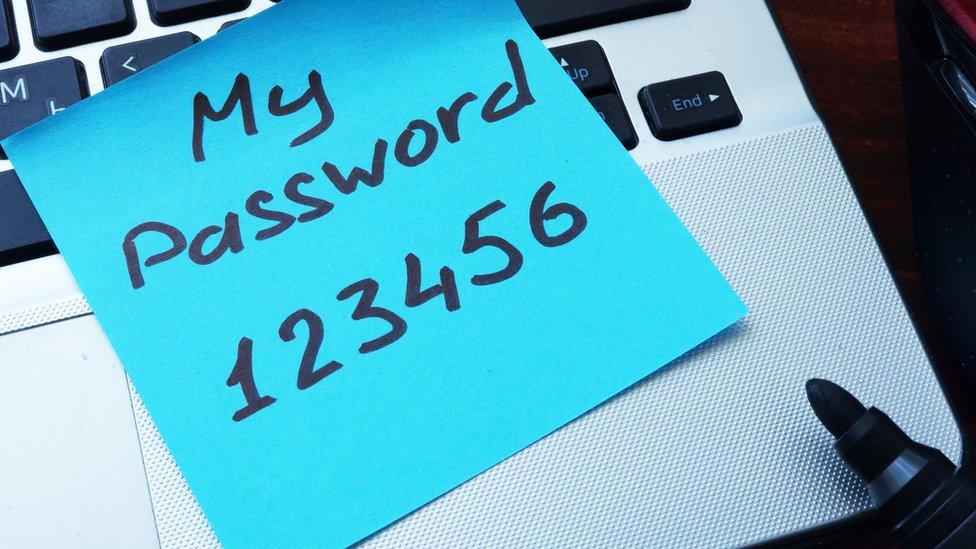Is 123456 your password? Then you need to change it!
- Published
- comments

Does the password '123456' seem scarily familiar to you? Then it might be that you're using a password shared by more than 23.3 million people.
A recent study by the UK's National Cyber Security Centre found that millions of us are using the same passwords to protect our valuable data.
An easy or popular password makes accounts vulnerable to being hacked by some not very nice people.
But it's not just numbers that are popular - names like Ashley, Michael and Daniel and even football teams are being used by hundreds of thousands of people.
Is one of your passwords one of the most popular in the UK? Check our list below.
Want more information on avoiding hacks? Check out Own It's amazing guide to staying safe from hackers.
Don't be that person...
Do you use one of these popular passwords?
According to the UK's National Cyber Security Centre - many of us are using the same passwords to protect our valuable information.
Do you use any of the following passwords? If so, you're definitely not the only one.
123456 - 23.2 million (total number of users)
123456789 - 7.7 million
qwerty - 3.8 million
1111111 - 3.1 million
password - 3.6 million
ashley - 432,276
michael - 425,291
superman - 333,139
liverpool - 280,723
manutd - 59,440
Football teams, popular shows and characters, your name, or just the word 'password' are not great ways to secure your data.
If you think it's time for a security upgrade, then read on.
Anyone can create a secure password that's easy to remember.
How do I create a secure password?
Protecting your data online is very important for your safety.
If someone is able to access a personal account, they might find personal information you wouldn't want them to know, and often they can use this data to cause harm.
But there are ways of protecting yourself against attacks like this.
Creating a secure, easy to remember password is easier than you think.
Follow these steps to create a password that's personal to you, and hard to crack.
Don't use something obvious: Your favourite football team is not a great idea, even your least favourite football team is not a good idea. You want something a bit more complicated than just a name.
Think of a phrase, not a word: The longer a password is, the harder it is to guess. For example, "You'll never walk alone" is an easy to remember phrase.
Use lower and upper case letters: Now you've got your phrase, you might want to change this to something more random - perhaps you capitalise all the vowels, so "You'll never walk alone" becomes "yOUllnEvErwAlkAlOnE" A little bit harder to guess!
Use numbers and symbols: If you want to go to the next level of security - why not throw a few numbers and symbols in. You can replace certain letters with similar looking numbers, for example - an 'l' can become a '1'. So "yOUllnEvErwAlk AlOnE" becomes "yOU11nEvErwA1kA1OnE".
Don't tell anyone about your password: This may seem obvious, but there are easy ways to lose that secure password you've created. Signing into a shared computer and leaving yourself logged in to an important personal account, sharing personal accounts with friends and bragging about how good your password is are all ways that leave you vulnerable to hacking.
If you find out that someone has hacked your account, make sure to change your password immediately and tell an adult you trust about what has happened.
And finally - don't use the password example we've used. We know you're a lot more creative than that!
Want more information on avoiding hacks? Check out Own It's amazing guide to staying safe from hackers.
- Published9 February 2016
- Published16 May 2017
- Published25 June 2018
